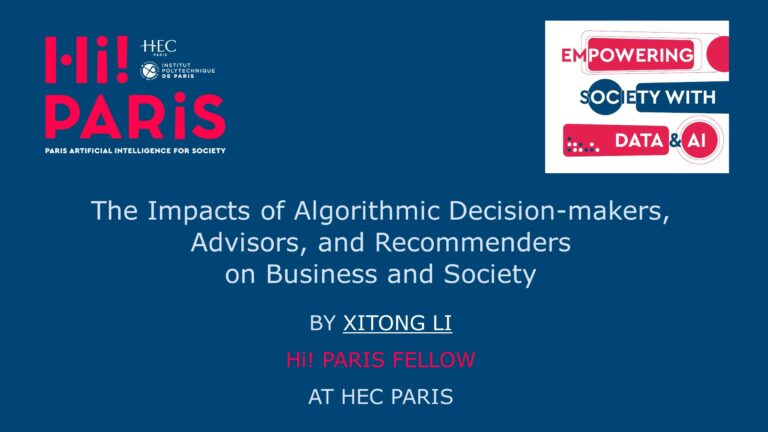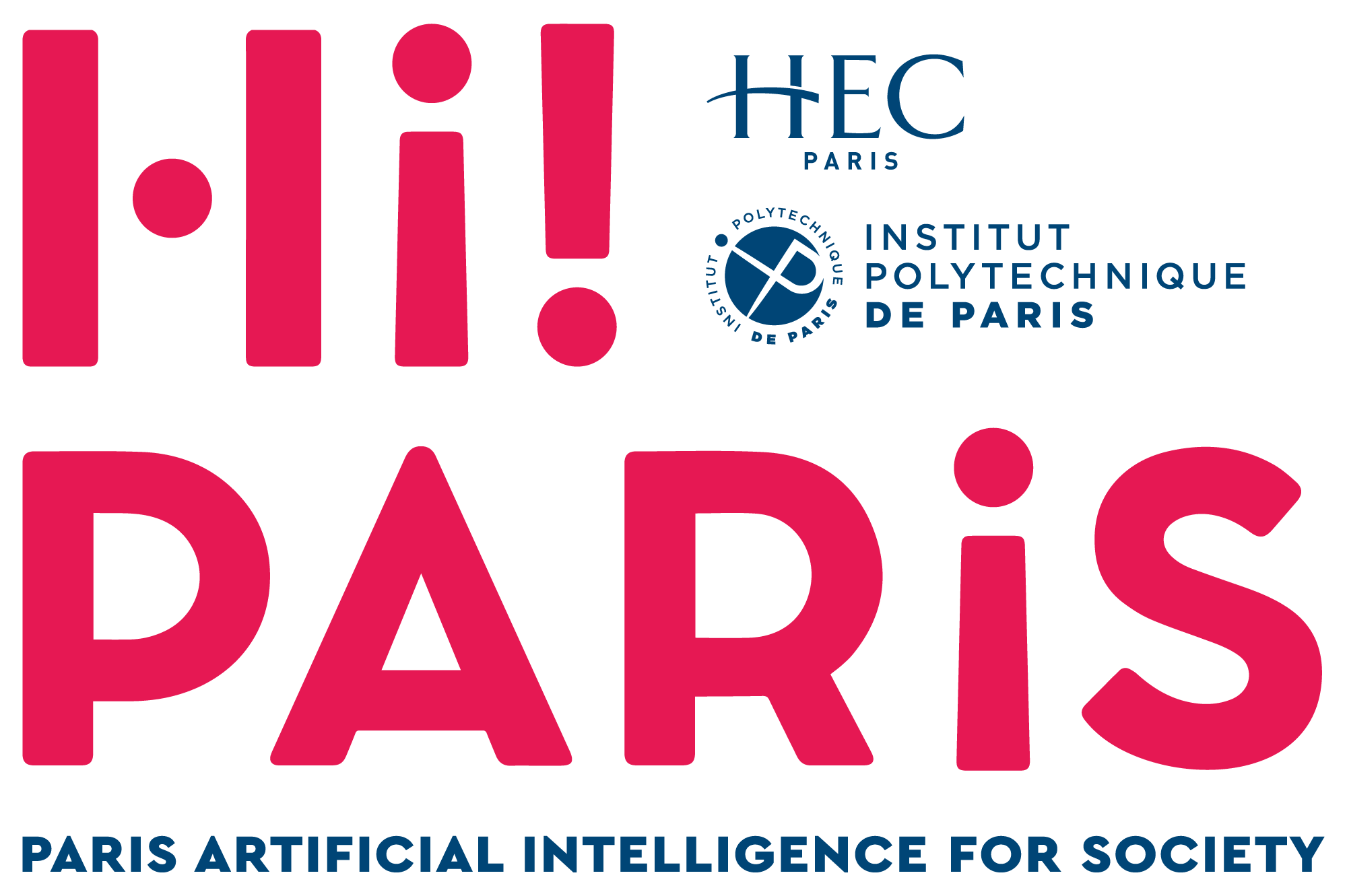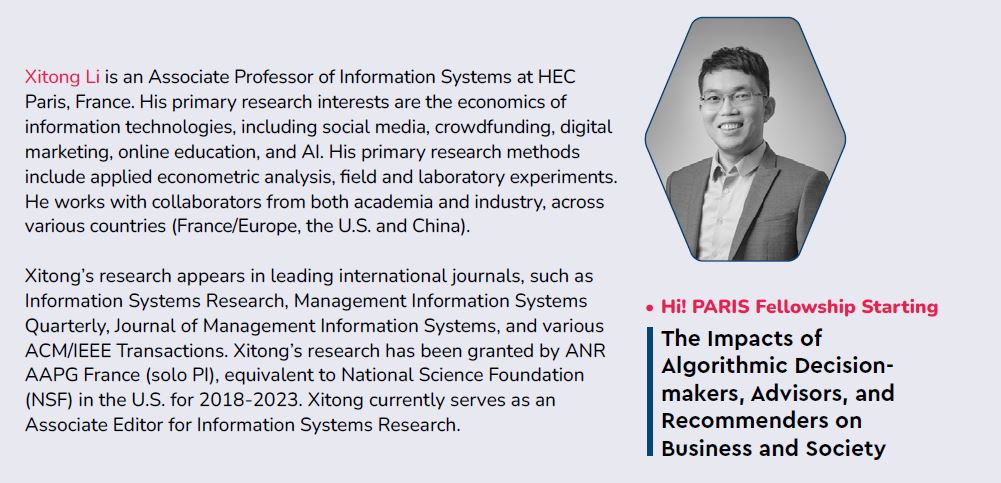Quantifying impacts of AI on business and society – Xitong Li
We are delighted to present the project of Xitong Li, Hi! PARIS Fellow 2021.
Xitong Li is an associate professor at HEC Paris in the Department of Information Systems and Operations Management. As a social scientist, his project with Hi! PARIS aims at measuring the impacts of algorithmic decision-makers, advisors, and recommenders on business and society.

Quantifying impacts of AI on business and society
Information technologies, such as algorithms, computer programs or social media, are omnipresent in our daily life. Whether we are aware of it or not, they affect our behaviours. Here lies the fundamental question of information systems, a field of research in which Xitong Li is a specialist. “As a social scientist with a training in economics, my goal is to study and quantify the impacts of such systems and applications on people, firms and society in general” Xitong explains. Not all of information systems embed artificial intelligence (AI), but it is one of their latest evolutions. “AI is now widely used and very popular, that is why I became naturally interested in it”.
For his HI! PARIS fellowship project, he has sorted existing AI artefacts in three categories. The first category is algorithmic recommenders, already used to a large extent by online retailers to recommend personalized products to online shoppers. Algorithmic advisors, the second category of AI artefacts, aim to assist human judgement. For example, an AI may be trained to recognize cancer in medical images and help physicians make a diagnosis. The third and most recent type comprises algorithmic decision-makers, where humans let algorithms make decisions and choices on behalf of them.
When product recommenders came out, many firms implemented them on their websites. One of the first question scientists asked was whether it increased the sales. “The literature suggests a positive answer, which is good for online retailers. In my research, however, I am taking the consumers’ perspective.” Is the net value from their point of view really greater with the algorithmic recommender than without it? The answer is not straightforward due to the lack of objective field data measuring the net value of a product. To answer this question, a field experiment was conducted with a random set of consumers that can see recommendations and another set of consumers that cannot see those recommendations while shopping on the same website. Xitong Li and his collaborators were able to collected some unique data about the co-views and co-purchases of recommended products from an online retailer’s system. By using applied econometrics methods, he hopes to measure the recommender’s net value for the consumer as objectively as possible.
As for algorithmic advisors, Xitong Li is trying to find out to which extent humans can change their predictions on a basic prediction task after receiving advice from an AI, compared to a situation where they receive the same advice from human. “Some literature shows that humans are more likely to change their judgement when the advice is given by an algorithm”, explains the Hi! PARIS fellow. On top of that, we are assessing how algorithmic transparency would change this kind of human appreciation on algorithmic advice by conducting a series of online experiments: if we provide more information about the algorithm’s performance, will the participants be more likely to change their prediction after receiving the advice from the AI?”
The third category of AI artefacts, algorithmic decision-makers, also highlight the question of information systems’ influence on human actions. Algorithmic trading is one of the prominent applications currently in use. On the peer-to-peer lending platform Xitong Li is investigating with, different labels indicate which investment are done manually and which are done automatically. This allows to study herding behaviours, i.e., whether other humans follow previous AI decision-made investments.
“Besides the fundamental questions my HI! PARIS fellowship will help investigate, I encourage firms and managers to contact me if they’d like to quantify the impacts of their AI related initiatives” says Xitong Li. Although AI systems can be very useful, the researcher also calls for some caution. AIs may be biased in some way, and biases may end up exaggerated if we use algorithms without care. For sure, AI will remain a hot topic in the next few years and its usage will increase, so understanding how it affects our business and society is much needed.



